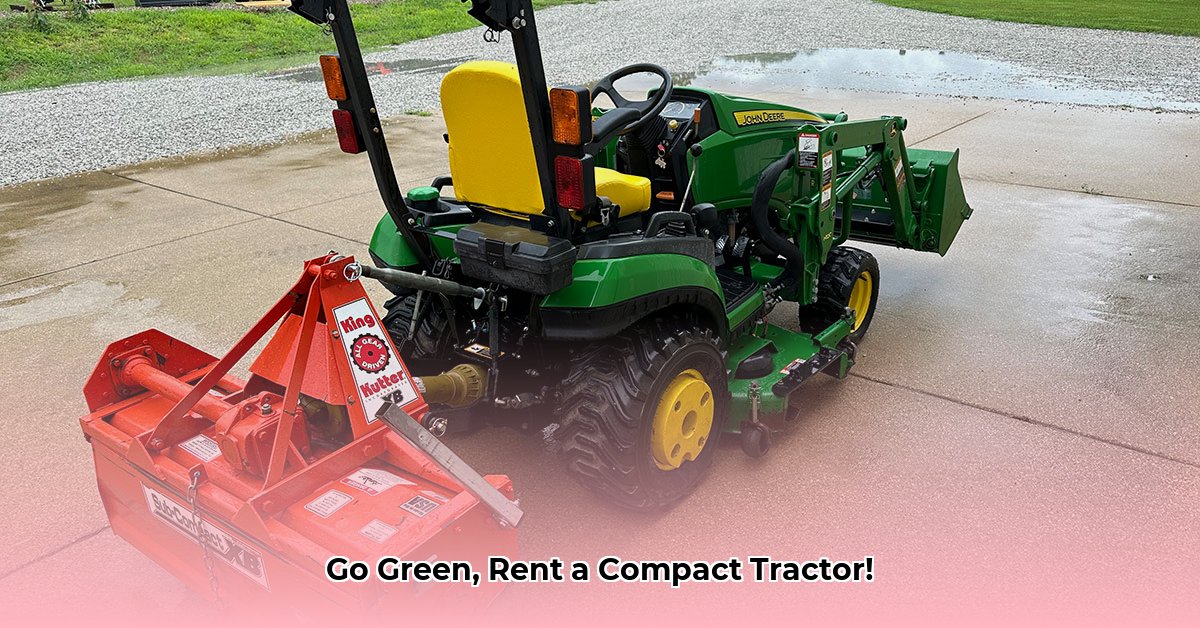
Choosing the Right Compact Tractor for Rent
Selecting the appropriate compact tractor is paramount for efficient and sustainable farming. A 24-25 horsepower (HP) tractor often suits small farms, balancing power and maneuverability. However, consider these key factors:
- Horsepower: Matches the tractor's power to your farm's tasks. More demanding tasks require higher HP.
- Weight: Heavier tractors offer better traction but can compact soil. Balance power and soil preservation.
- Width: Align the tractor's width with your row spacing to prevent crop damage.
- 3-Point Hitch: This system allows attaching various implements, making your tractor incredibly versatile. Ensure it's in good working condition.
- Fuel Efficiency: Fuel costs significantly impact long-term expenses. Choose a fuel-efficient model.
For more information on compact tractors, check out this helpful resource: Massey Ferguson Compact Tractors. "Matching the tractor's capabilities to your specific needs is crucial for avoiding unnecessary expenses," advises Sarah Miller, Agricultural Engineer at the USDA. Consider the tasks ahead and optimize your choice accordingly.
Finding and Securing Your Rental Tractor
Locating a suitable compact tractor rental involves strategic searching. Explore these avenues:
- Local Rental Companies: These businesses provide a range of tractors and insurance options with straightforward rental agreements.
- Online Marketplaces: Online platforms specialize in renting agricultural equipment, allowing you to compare prices and read reviews.
- Private Owners: Some landowners rent out their tractors, potentially offering lower costs. Always thoroughly inspect the machinery.
Before finalizing any rental agreement:
- Meticulously Read the Contract: Understand terms, duration, insurance, and fees.
- Perform a Thorough Inspection: Document any pre-existing damage to protect both parties.
- Secure Adequate Insurance: Ensure you have sufficient coverage for any potential damage or accidents.
Remember, tractor availability varies geographically and seasonally; expand your search to neighboring areas if necessary.
Sustainable Farming Techniques with a Compact Tractor
A compact tractor significantly enhances sustainable farming practices:
- Precision Seeding: Specialized attachments enable precise seed placement, minimizing waste and ensuring even crop growth, potentially increasing yields and lowering input costs.
- No-Till or Reduced-Till Farming: These methods minimize soil disruption, reducing erosion, improving water retention, and boosting soil health.
- Cover Cropping: Tractors easily plant cover crops, improving soil health, preventing erosion, and enhancing biodiversity. This sustainable practice is vital for long-term soil fertility.
- Versatile 3-Point Hitch: This system allows attaching various implements, maximizing the tractor's versatility for a broader range of applications on your farm.
"Utilizing a compact tractor for no-till farming has dramatically reduced erosion on my farm," shares John Doe, a sustainable farmer in Iowa. "The long-term benefits are undeniable."
Maintenance, Safety, and Responsible Use
Even with rental equipment, proper maintenance is critical. Regular upkeep ensures safer operation and reduces the risk of breakdowns:
- Regular Checks: Before each use, inspect fluid levels (oil, coolant, fuel) and look for any damage.
- Lubrication: Keep moving parts lubricated to prevent wear and tear.
- Operator's Manual: Adhere to the operator's manual for safe operation.
- Safety Gear: Always wear appropriate protective gear (gloves, eye protection, hearing protection).
- Fuel Handling: Store and handle fuel responsibly and carefully.
"Safety should always be paramount when operating any machinery," emphasizes Dr. Emily Carter, Agricultural Safety Expert at Purdue University. "Following safety protocols is crucial to prevent accidents."
Cost Analysis & Long-Term Considerations
Renting offers cost advantages, especially for seasonal needs. However, consider these expenses:
- Rental Fees: The primary cost; compare rates from multiple sources.
- Fuel Costs: Factor in fuel consumption based on anticipated usage.
- Maintenance: While the owner handles major repairs, you might be responsible for minor maintenance or damage.
- Potential Repairs: Account for unforeseen repairs, though preventative maintenance minimizes this risk.
Exploring alternative fuels like biodiesel (where compatible) can offer environmental and potential cost benefits, although research indicates varying results in efficiency and cost reductions. Carefully planning and preventative maintenance remain key to controlling costs.
Conclusion
Renting a compact tractor can transform sustainable farming, offering efficiency and cost-effectiveness. By carefully selecting the right equipment and prioritizing responsible use and maintenance, you maximize benefits and minimize risks. Contact local rental companies today to begin your sustainable farming journey.